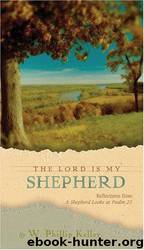The Lord Is My Shepherd: Reflections From a Shepherd Looks at Psalm 23 by W. Phillip Keller by W. Phillip Keller

Author:W. Phillip Keller
Language: eng
Format: mobi, epub
Tags: Meditations, Religion
ISBN: 9780310988700
Publisher: Inspirio
Published: 2003-06-15T14:01:55+00:00
7
“Yea, Though I Walk Through the Valley ...”
From a shepherd’s point of view this statement marks the halfway stage in the Psalm. It is as though up to this point the sheep has been boasting to its unfortunate neighbor across the fence about the excellent care it received from its owner on the “home” ranch throughout the winter and spring.
Now it turns to address the shepherd directly. The personal pronouns I and Thou enter the conversation. It becomes a most intimate discourse of deep affection.
This is natural and normal. The long treks into the high country with their summer range begin here. Left behind are the neglected sheep on the other side of the fence. Their owner knows nothing of the hill country— the mountain meadows to which these sheep will be led. Their summer will be spent in the close companionship and solitary care of the good shepherd.
Both in Palestine and on our western sheep ranches, this division of the year is common practice. Most of the efficient sheepmen endeavor to take their flocks onto distant ranges during summer.
This often entails long “drives.” The sheep move along slowly, feeding as they go, gradually working their way up the mountains behind the receding snow. By late summer they are well up on the remote alpine meadows above the timberline.
With the approach of autumn, early snow settles on the highest ridges, relentlessly forcing the flock to withdraw down to lower elevations. Finally, toward the end of the year as fall passes, the sheep are driven home to the ranch headquarters where they will spend the winter. It is this segment of the yearly operations that is described in the last half of the poem.
During this time the flock is entirely alone with the shepherd. They are in intimate contact with him and under his most personal attention day and night. That is why these last verses are couched in such intimate first-person language. And it is well to remember that all of this is done against a dramatic background of wild mountains, rushing rivers, alpine meadows, and high rangelands.
David, the Psalmist, of course knew this type of terrain firsthand. When Samuel was sent of God to anoint him king over Israel, he was not at home with his brothers on the “home” ranch. Instead he was high up on the hills tending his father’s flock. They had to send for him to come home. It is no wonder he could write so clearly and concisely of the relationship between a sheep and its owner.
He knew from firsthand experience about all the difficulties and dangers, as well as the delights, of the treks into high country. Again and again he had gone up into the summer range with his sheep. He knew this wild but wonderful country like the palm of his own strong hand. Never did he take his flock where he had not already been before. Always he had gone ahead to look over the country with care.
All the dangers
Download
The Lord Is My Shepherd: Reflections From a Shepherd Looks at Psalm 23 by W. Phillip Keller by W. Phillip Keller.epub
This site does not store any files on its server. We only index and link to content provided by other sites. Please contact the content providers to delete copyright contents if any and email us, we'll remove relevant links or contents immediately.
The 5 Love Languages: The Secret to Love That Lasts by Gary Chapman(9790)
The Space Between by Michelle L. Teichman(6929)
Assassin’s Fate by Robin Hobb(6200)
Wiseguy by Nicholas Pileggi(5770)
Everything Happens for a Reason by Kate Bowler(4734)
Gerald's Game by Stephen King(4642)
Pillow Thoughts by Courtney Peppernell(4271)
A Simplified Life by Emily Ley(4158)
The Power of Positive Thinking by Norman Vincent Peale(4062)
Harry Potter and the Prisoner of Azkaban (Book 3) by J. K. Rowling(3350)
Resisting Happiness by Matthew Kelly(3337)
Girl, Wash Your Face by Rachel Hollis(3282)
Being Aware of Being Aware by Rupert Spira(3272)
The Secret Power of Speaking God's Word by Joyce Meyer(3182)
The Code Book by Simon Singh(3180)
More Language of Letting Go: 366 New Daily Meditations by Melody Beattie(3024)
Real Sex by Lauren F. Winner(3014)
Name Book, The: Over 10,000 Names--Their Meanings, Origins, and Spiritual Significance by Astoria Dorothy(2979)
The Holy Spirit by Billy Graham(2944)
